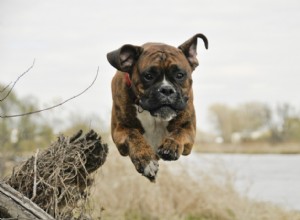
 Průvodce plemenem Shiba Inu:Historie, vlastnosti a tipy na péči
Průvodce plemenem Shiba Inu:Historie, vlastnosti a tipy na péči
 Průvodce plemenem Akita:Historie, vlastnosti a péče
Průvodce plemenem Akita:Historie, vlastnosti a péče
 Průvodce plemenem zlatého retrívra:Historie, vlastnosti a péče
Průvodce plemenem zlatého retrívra:Historie, vlastnosti a péče
 Průvodce plemenem australského ovčáka:Historie, vlastnosti a péče
Průvodce plemenem australského ovčáka:Historie, vlastnosti a péče
 Průvodce plemenem Corgi:Historie, vlastnosti a tipy na péči
Průvodce plemenem Corgi:Historie, vlastnosti a tipy na péči
 Průvodce plemenem pomeranian:Historie, vlastnosti a péče
Průvodce plemenem pomeranian:Historie, vlastnosti a péče
 Průvodce plemenem Cane Corso:Charakteristika, historie a péče
Průvodce plemenem Cane Corso:Charakteristika, historie a péče
 Průvodce maltézským plemenem:Historie, vlastnosti a tipy na péči
Průvodce maltézským plemenem:Historie, vlastnosti a tipy na péči
Boxeři jsou známí svou loajalitou, charismatem a inteligencí. Boxeři, jedno z prvních plemen, které uznal American Kennel Club, patří dnes mezi nejoblíbenější plemena a řadí se na desáté místo na seznamu AKC.
I když se na první pohled mohou zdát trochu zastrašující, boxeři jsou ve skutečnosti velmi milí a hraví. Jejich ochranné instinkty je také předurčují pro rodiny s dětmi.
Nejste si jisti, zda je pro vás boxer tím pravým psem? Pokračujte ve čtení, abyste se dozvěděli více o tomto plemeni, včetně historie, osobnostních rysů, požadavků na péči a dalších.
Tip pro profesionály: Majitelům psů může být proplaceno až 90 % způsobilých veterinárních účtů tím, že se zaregistrujete do pojištění zvířat. Porovnejte plány zdravotního pojištění Boxer, abyste měli klid s vědomím, že váš milovaný mazlíček bude mít přístup ke skvělé veterinární péči po celý život.
Boxeři jsou podsadití a svalnatí psi. Boxerky váží 50 až 65 liber a mohou být vysoké 21 až 25 palců, zatímco muži váží 65 až 80 liber a dorůstají výšky asi 25 palců.
Boxerští psi mají výrazně tvarované hranaté hlavy s předkusem čelistí a tupým čenichem. Mají široký a hluboký hrudník, relativně krátký a silný hřbet a ocasy, které se na konci mírně kroutí. Jejich uši se skládají, ale často jsou kupírované, aby stály vzpřímeně, a mají kompaktní tlapky a klenuté prsty.
Boxeři jsou středně hnědí, s krátkou srstí, která se dodává ve třech barevných variantách:plavá, žíhaná a bílá. Jejich maska je obvykle černá, ale mnoho členů plemene má bílé znaky na obličeji, stejně jako bílé znaky na tlapkách a hrudi.
Boxeři jsou energičtí a inteligentní psi, kteří se rádi zaměstnávají. Jsou velmi loajální a připraveni střežit svůj domov a majitele v případě potřeby.
Obvykle dobře vycházejí s ostatními psy a kočkami, jsou-li socializováni od mládí, ale také mají pověst agresivity vůči neznámým zvířatům, takže jako všichni psi by jim nemělo být dovoleno pobíhat volně nebo bez dozoru.
Boxeři nejsou známí jako velcí štěkaři, a pokud štěkají, obvykle to má dobrý důvod. Jsou však docela hlasití a mají tendenci vydávat vrčivé zvuky, které jsou jen jejich způsobem mluvení. Zatímco vrčení normálně slouží jako varovný signál psa, že je vystrašený nebo rozrušený, u tohoto plemene tomu tak nemusí být vždy.
Průměrná životnost boxerů se pohybuje mezi 10 a 12 lety. Nemálo majitelů však o své mazlíčky přijde mnohem dříve, nejčastěji na rakovinu. Podle studie University of Georgia ze 70 000 psů více než 80 plemen je rakovina hlavní příčinou úmrtí boxerů a představuje téměř 45 % úmrtí.
Na druhou stranu někteří boxerští psi údajně dosahují až 15 let. Existují dokonce zdokumentované případy příslušníků plemene, kteří se dožili až 16 let.
 Historie boxera
Historie boxera
Boxeři jsou příbuzní téměř všem plemenům buldočího typu. Boxer vznikl v Evropě v 16. století, ale toto plemeno bylo zdokonaleno v Německu koncem 19. století a začátkem 20. století.
Boxers were originally used for dog-fighting but were later developed into hard-working and loyal dogs that were used as hunters, protectors, cattle dogs, war dogs, guide dogs for the blind, and police dogs.
The breed was recognized by the American Kennel Club in 1904 but started to gain popularity in the US during the 1930s. Today, the breed ranks 10th on AKC’s list of most popular dog breeds.
Early socialization and puppy classes are recommended in order to properly channel the breed’s energy. Boxers are very intelligent but can easily become bored with repetitive routines which may result in dangerous or destructive behaviors at home. They are also good at problem-solving but can sometimes be quite stubborn. Boxers enjoy participating in a number of canine activities including agility, herding, and obedience. They are also great as therapy, assistance, service, and police dogs.
As mentioned before, Boxers are very energetic and playful, so they require lots of daily exercise (be sure that your dog is always on a leash or in a securely fenced area). Being originally bred as wild game chasers, Boxers also like to jump and leap, especially when they’re small puppies. Their intelligent and curious nature also make them great candidates for mental exercise with puzzle toys, snuffle mats, and other games that require them to use their brains.
Boxers have a short coat that requires little grooming - a short brushing once or twice a week should be enough. They’re also clean dogs and only need baths occasionally. Their nails need to be trimmed about once a month and their teeth should be brushed frequently in order to prevent tartar buildup.
Boxers should be fed two or three cups of good-quality dog food twice a day, though their exact intake will be based on their activity level and size as determined by your boxer’s veterinarian. As a deep-chested breed, Boxers are anatomically predisposed to gastric dilatation-volvulus (GDV or canine bloat), so you might want to provide an elevated food bowl so that your pup doesn't have to bend down to the floor to eat as this can minimize the amount of air being ingested with their food. Feeding two meals can help prevent your Boxer from eating too fast or too much, which can cause bloat. Additionally, try to limit playtime or exercise for 30 minutes before and after meals to reduce the risk of GDV.
Boxers enjoy the company of their owners and don’t like being left outside alone. In addition, exposure to outside temperatures for longer periods of time isn’t healthy for them. Due to the relatively thin coat, the breed has poor tolerance to heat and cold.
In hot weather, Boxers kept outside are vulnerable to breathing issues, dehydration, and heatstroke. When it's very hot outside (over approximately 85 degrees Fahrenheit) limit your boxers time outside to the early mornings and evenings if possible and avoid strenuous outdoor exercise. In cold weather, when the temperature falls below freezing, be sure to provide a warm coat or fleece and booties for your dog to keep them warm while exercising outdoors.

Like all dog breeds, Boxers are prone to certain health issues, including genetic diseases like arrhythmogenic right ventricular cardiomyopathy, a congenital heart disease that’s usually fatal.
Other genetic medical conditions that commonly affect the breed include:
Responsible breeders will screen their breeding dogs for genetic abnormalities and try to breed only animals who are healthy and less likely to carry these heritable diseases. Always ask to see veterinary screening certificates for a puppy’s parents and grandparents before you buy a Boxer from a breeder.
Other health conditions affecting Boxer dogs include:
Boxers belong to the brachycephalic breed class, which means that their flat face and wrinkled snout can cause breathing difficulties, especially during hot weather.
Tip pro profesionály: Boxers do have their share of health problems, which is why it’s a good idea to sign your Boxer up for pet insurance while they are still a puppy.
If you’re thinking about welcoming a Boxer into your family, start by contacting the American Boxer Club for reputable breeder referrals and listings of Boxer rescues throughout the States.
Be sure to conduct thorough research before you get a Boxer to make sure the breed is right for you.
If you’re interested in similar breeds, consider looking into Cane Corso, Boston Terrier, and Bullmastiff. You should also consider the many different Boxer mixes, including:

Z 16 456 psů v kategorii pracovní plemeno registrovaných v roce 2013 byl nejoblíbenější boxer; se 4003 registrovanými psími psími převyšuje druhou nejvyšší, Bordeauxskou dogu, o více než 1600. Tvoří téměř čtvrtinu počtu registrovaných pracovních psů, důvodem extrémní popularity boxera je jeho temper

Němečtí ovčáci, původně vyvinutí k pasení ovcí, se vyvinuli v mnohem víc než jen pracovní psi. Toto oblíbené plemeno je neúnavné, inteligentní a sportovní. Kromě svých běžných rolí ve veřejné službě jsou němečtí ovčáci často skvělými rodinnými psy, protože bývají mírní, společenští, hraví a chrání s